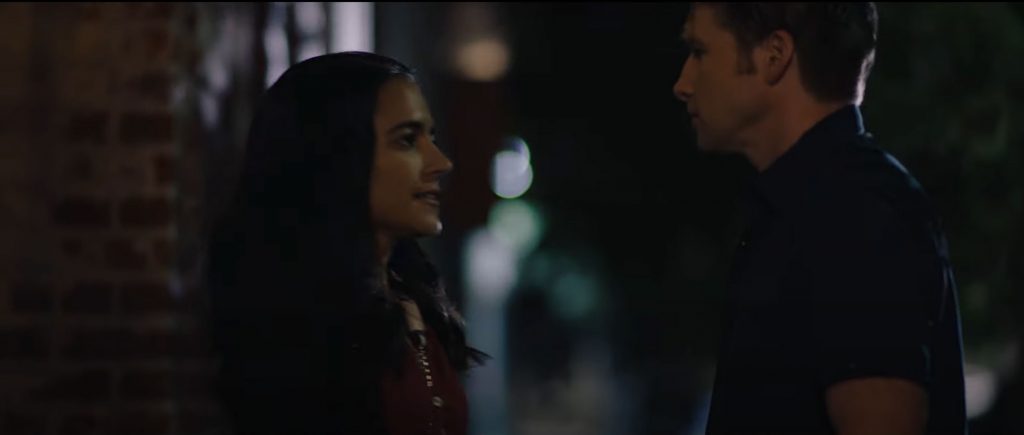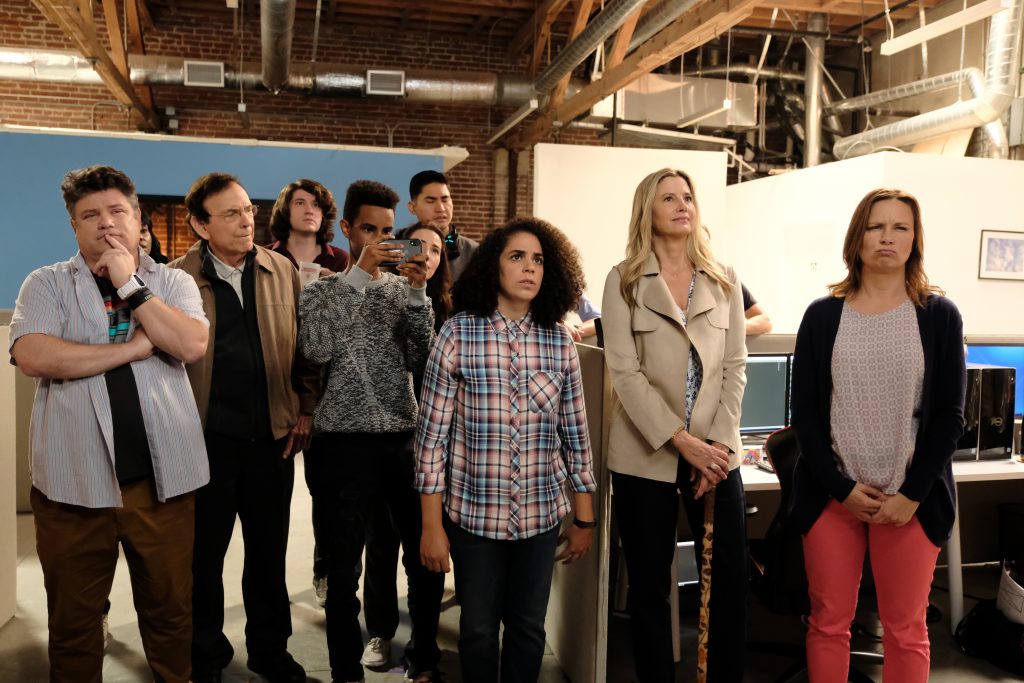July 17, 2021
by Carla Hay

Directed by D.W. Thomas
Culture Representation: Taking place in Los Angeles, the horror comedy film “Too Late” features a predominantly white cast of characters (with a few African Americans) representing the middle-class and working-class.
Culture Clash: A stand-up comedy booker has a cannibal monster for a boss, and her secret job is to find comedians for him to eat.
Culture Audience: “Too Late” will appeal primarily to people who don’t mind watching boring, low-quality comedies that aren’t funny.

The only thing scary about the horror comedy “Too Late” is that people thought this painfully unfunny dud was good enough to make into a movie. The plot is ridiculous, even by lowbrow standards, and not even the presence of some fairly well-known cast members can save this awkward mess of a film. “Too Late” is the first feature film from director D.W. Thomas and writer Tom Becker, who both have extensive backgrounds as film editors. This movie is proof that having experience in one area of filmmaking doesn’t automatically make people skilled in other areas.
“Too Late” (an 80-minute movie that feel like longer because of the sluggish pacing) has a group of actors who seem to be trying their best to salvage this horrendous movie, but there’s only so much they can do when they’ve been given such cringeworthy dialogue to say. The movie is set in the Los Angeles stand-up comedy scene, but there isn’t one single comedian in this movie who is genuinely funny. There’s also a tiresome runnng gag in the film where the chief villain keeps saying that comedians aren’t real people.
Unfortunately, there’s too much interruption of the main story with several cutaways to very amateurish and mediocre-to-bad stand-up comedy routines on stage, from people making cameos that have nothing to do with the main story. It’s appalling, low-quality work from “Too Late” director Thomas, who also edited this movie. As someone with a film editing background, she should know better than to have these choppy and distracting edits in the first feature film that she’s directed.
However, it’s not as if the main story of “Too Late” is all that compelling. It’s downright dumb. The gist of the main plot is that an overworked and underappreciated stand-up comedy booker/assistant named Violet Fields (played by Alyssa Limperis) has a tyrant boss named Bob Devore (played by Ron Lynch), and they both have a secret: Bob is really a cannibal monster, and Violet’s real job with him is to book stand-up comedians so that Bob can kill and eat them. He eats them whole, so their bodies aren’t found.
Violet is afraid to quit because Bob has told her that he’ll kill her if she quits. At one point in the movie, Bob ominously says to Violet, “Violet would never leave me, would you Violet? … In fact, you would probably die without me.” Bob also keeps telling Violet, as if he’s some kind of cannibal self-help guru: “Life’s too short.”
The plot of “Too Late” immediately raises questions that the movie never bothers answering. Wouldn’t it be obvious for the police to figure out that the missing stand-up comedians all worked for Bob, thereby making him a person of interest? Even though several people are murdered in the movie, there are no police investigations. And why should viewers root for Violet, who’s an accomplice to murder?
According to what’s said in the movie, she’s been working with Bob for several years, which makes Violet even more despicable for participating in and covering up these murders over such a long period of time. Violet has a housemate friend named Belinda (played by Jenny Zigrino), who keeps telling Violet that Violet should quit working for Bob, but Violet ignores this advice. Violet’s work as Bob’s assistant requires her to be at his constant beck and call. It’s taken a toll on Violet’s love life, which Belinda calls “a drought.”
Belinda comments to Violet about Bob: “He’s never going to let you go!” Violet responds, “I feel like I’m on an island. I feel like there’s a million bridges off of it, but every single one burns the second I try to leave.” You know it’s a bad comedy when the lines that are supposed to be funny aren’t funny, and the lines that are supposed to be serious might unintentionally make people laugh because they’re so cheesy.
Bob is the promoter of a stand-up comedy series called Too Late, which is held at a small theater called The Hayworth. It’s supposed to be one of the hottest comedy promotions in Los Angeles. Well, apparently not, because comedians can get murdered by Bob shortly after they’re booked to perform at Too Late. And no one in this silly movie figures it out, so people keep getting murdered.
Meanwhile, Violet books her own stand-up comedy series at a tiny coffee shop. It’s here that she meets an obnoxious aspiring stand-up comedian named Dax Hanlan (played by Billy Breed), who says he’s originally from Boston. Dax sidles up to Violet as she’s watching a comedian on stage and tries to flirt with her. Once he finds out that she’s the booker for Too Late, he tries to weasel his way into getting her to book him.
Violet is cold and dismissive when she repeatedly tells Dax that he can apply on the Too Late website. He won’t take the hint and still desperately tries to get Violet to pay attention to him. Finally, Violet tells Dax that it’s not a good idea to alienate the person who’ll decide whether or not he’ll be booked at Too Late. As she walks away, Dax mutters underneath his breath, “Stuck-up bitch.” Violet doesn’t hear him say this derogatory comment, but it’s at this point in the movie that you know that Dax is going to be an upcoming meal for Bob.
The comedians whom Violet books and sometimes hangs out with are very untalented and have shallow personalities. The worst is David Zeller (played by Jack De Sena), who’s the type of loser who throws a costume party with a mass suicide theme, so people come dressed to the party as cult members. Yes, this heinous movie tries to make mass suicides a comedic plot gimmick.
David hasn’t gotten on Violet’s bad side, so she’s decided she’s not going to feed him to Bob. Is that supposed to make her look classy? During the course of the story, Violet makes promises to some other comedians to book them for Too Late: Andy Jocelyn (played by Paul Danke), Chase Morrow (played by Brooks Wheelan) and Jimmy Rhodes (played by Will Weldon). These unskilled hacks might or not become murder victims of cannibal Bob and his cowardly assistant Violet.
Jimmy actually becomes Violet’s love interest, but their romance is so boring, it might put viewers to sleep. It isn’t until Violet starts developing feelings for Jimmy that she tries to deter him from wanting to be booked for Too Late. Violet and Jimmy have a not-so-meet-cute moment when Violet finds herself hiding in David’s bedroom closet during David’s “mass suicide” party, because David has unexpectedly gone into the room to have a sexual tryst with a female party guest. Violet doesn’t want David to know she was in his room to have some time alone, so that’s why she thinks it’s better to hide in the closet like a creep, rather than politely excuse herself and walk out of the room with some dignity.
While hiding in this closet, Violet meets Jimmy, who tells her that he’s renting the closet from David as a place to live. (As far-fetched as these living conditions might be to some people, there are many real-life examples of people who pay rent to live in a closet because it’s all they can afford, usually in big cities where the cost of living is much higher than in other places.) And what do you know, Jimmy is an aspiring stand-up comedian too. Based on the way this terrible screenplay is written, the only men Violet can meet in Los Angeles are aspiring stand-up comedians. It’s pathetic.
If anyone is wondering if Violet books any female comedians, the answer is yes, but she’s never actually shown booking any female comedians or talking to any female comedians about booking them. There’s a fairly even mix of male and female comedians shown on stage in the annoying and unfunny performance clips that are inserted throughout the movie. But apparently, Violet only chooses male comedians to be cannibal victims for Bob.
Wait, isn’t that gender discrimination in this fake feminist movie? You know it’s a fake feminist movie because the filmmakers try to make it look like when a woman wants men to be killed, it’s supposed to be “female empowerment.” Real feminism is about gender equality, not hating on men and wanting them to be murdered. This movie is so despicable.
Mary Lynn Rajskub plays experienced and jaded comic Gina Obispo, one of the Too Late comedians who does a terrible stand-up comedy routine that this movie wants viewers to think is funny. It’s a small and useless role, because all Gina does when she meets Violet for the first time is try to get Violet to admit to two things: (1) Bob is horrible and (2) Violet wants to become a stand-up comedian.
Throughout the movie, people keep asking Violet if she’s a stand-up comedian, even though there’s absolutely nothing that indicates that dull-as-dirt Violet has a sense of humor. Violet keeps denying that she has an interest in being a stand-up comedian. It’s all just an obvious set-up for what comes later in the movie, in some very phony pandering to feminism.
And in a disservice to this movie’s so-called “feminist” message, Violet only cares about hanging out with and mentoring male comedians, not female comedians. The only female comedian whom Violet interacts with in this movie is Gina, and it’s for less than five minutes. Gina seems like she’s been doing stand-up comedy longer than Violet has been alive. In other words, Gina doesn’t need Violet to mentor her.
Another pointless role in “Too Late” is the one played by Fred Armisen. His character in the movie is dorky Fredo Muñoz, a sound/lighting engineer at The Hayworth. The Fredo character adds nothing to the story, unless you think it’s important to watch scenes where Bob berates Fredo for not having the type of blue tint that Bob wants for the stage lighting. Someone must’ve called in a big favor to have a well-known actor like former “Saturday Night Live” star Armisen be in this cesspool movie, which is a big step down from the work that he’s capable of doing.
As for “boss from hell” Bob, the movie doesn’t bother to describe his origins on how and why he’s a cannibal. He looks human, but he can, of his own free will, transform into a monster with long nails, fangs and decrepit-looking flesh. He sleeps in a coffin, but he’s not a vampire. He keeps yapping to Violet about the “dark of the moon,” but he’s not a werewolf. The visual effects are as tacky and unconvincing as you would expect them to be in this garbage film.
The filmmakers try very hard to make Violet look like she’s some kind of heroine, but she’s not. It’s as if viewers are supposed to forget that Violet has actively participated in serial murders. The entire concept of this movie is simply awful, just like the screenwriting and direction. “Too Late” should’ve been titled “Too Little, Too Late,” because that’s an accurate description of the quality of this movie.
Gravitas Ventures released “Too Late” in select U.S. cinemas, on digital and VOD on June 25, 2021.


